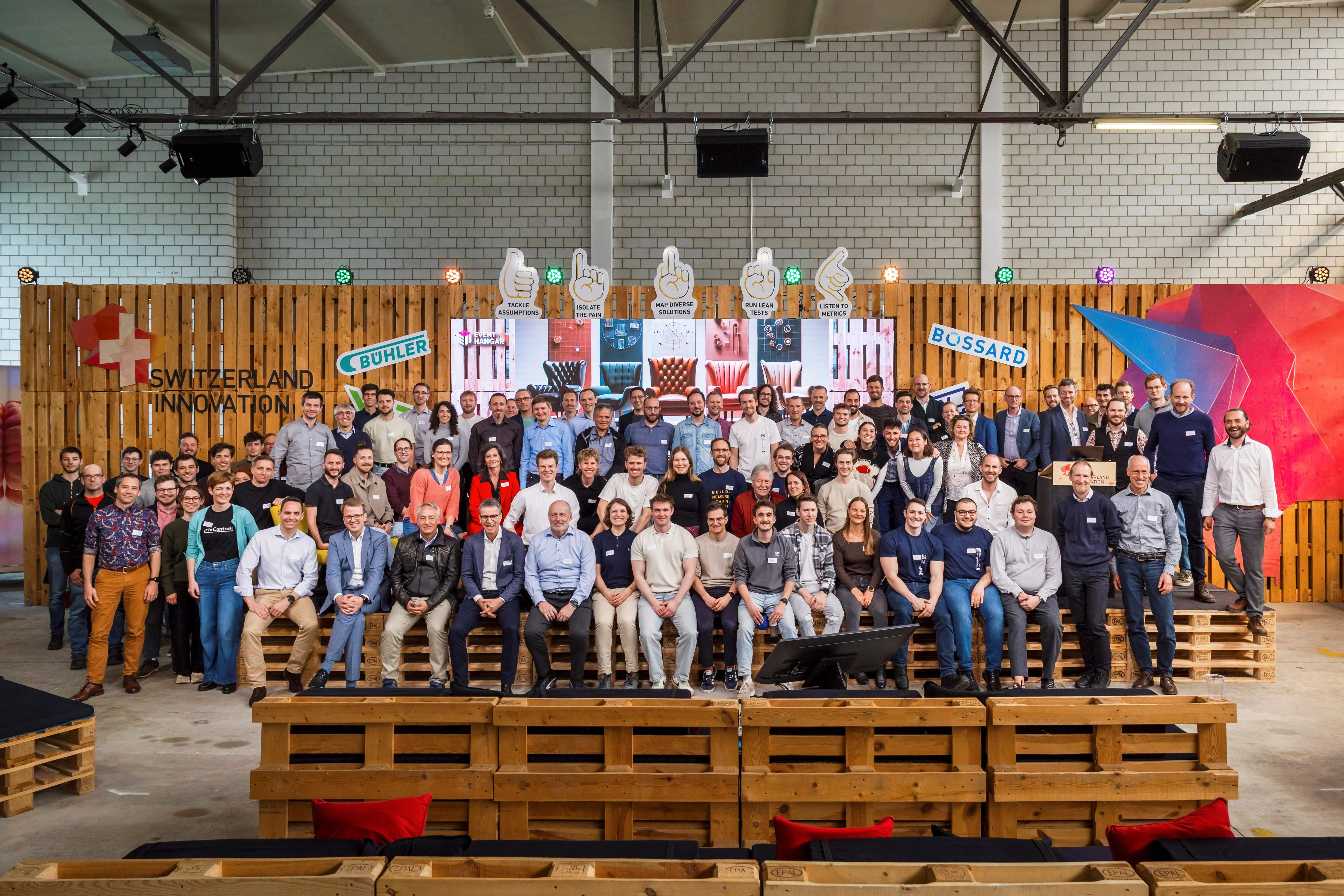Met het Bossard Exploration Lab creëren we ruimte voor slimme geesten en gedurfde ideeën. We dagen de status quo uit om nieuwe mogelijkheden te ontdekken.
15 juli 2025
Bossard Exploration Lab
De Bossard Group heeft in samenwerking met Feasibility Lab van de ETH Zürich, een van 's werelds toonaangevende universiteiten, om het Bossard Exploration Lab te runnen. Het Lab legt een brug tussen onderzoek, technologie en industrie.

Samenvatting
- De Bossard Group helpt de toekomst van Smart Factory-technologie vorm te geven.
- Meer dan 30 projectideeën zijn ontwikkeld in het Bossard Exploration Lab samen met studenten van ETH Zürich. Met het project "Battery Retrofit" is de stap naar industrialisatie gemaakt.
- Oplaadbare batterijen verlagen de kosten van onze SmartBins met meer dan 50% en verminderd de totale CO2-uitstoot met 16%.
Partnerschap met het Feasibility Lab van de ETH Zürich
De Bossard Group heeft in samenwerking met Feasibility Lab van de ETH Zürich, een van 's werelds toonaangevende universiteiten, om het Bossard Exploration Lab te runnen. Het Lab legt een brug tussen onderzoek, technologie en industrie.
Van oktober 2024 tot maart 2025 werkten ruim 50 medewerkers van Bossard, afkomstig uit verschillende landen, samen met studenten van ETH Zürich. Samen onderzochten en toetsten ze de haalbaarheid van meer dan 30 projectideeën.
Het eerste project dat naar productie wordt gebracht is Battery Retrofit, een herlaadbare batterij die speciaal is ontwikkeld voor toepassing in Bossard’s SmartBin-producten. Deze oplossing draagt bij aan efficiënter en duurzamer voorraadbeheer.
“Battery Retrofit is een uitstekend voorbeeld van hoe we samen met onze mensen en ETH Zürich de toekomst van slimme technologie vormgeven.” zegt Daniel Bossard, CEO van de Bossard Group. "Battery Retrofit" wordt geïmplementeerd in nauwe samenwerking met andere industriële partners. In de volgende fase zullen langdurige metingen worden uitgevoerd en zullen de eerste studies naar de laadinfrastructuur worden uitgevoerd. De uitrol is gepland voor begin 2026.
Inside the Bossard Exploration Lab: Ideeën die ertoe doen

Nieuwe technologie leidt tot kostenbesparingen
Bossard’s SmartBins zijn slimme containers voor geautomatiseerd magazijnbeheer van B- en C-delen. Ze maken gebruik van sensoren, draadloze communicatie en microcontrollers. Deze systemen vereisen een betrouwbare energiebron, idealiter draadloos en langdurig bruikbaar. De SmartBins registreren automatisch de voorraad en versturen data naar onze cloudoplossing ARIMS. Dit proces is energiezuinig dankzij de speciaal ontwikkelde elektronica en firmware, waardoor de baterijen tot vijf jaar meegaan.
Batterijen met een langere levensduur
Binnen het Bossard Exploration Lab is de bestaande batterijtechnologie opnieuw geëvalueerd. De huidige batterijen in onze SmartBins hebben een levensduur van ongeveer vijf jaar en worden daarna weggegooid. Voor een toekomstbestendige oplossing zochten we naar een duurzamer alternatief dat zowel technisch als economisch beter presteert.
De keuze viel op een herlaadbare lithium-ijzerfosfaatbatterij (LiFePO₄). Deze technologie biedt meerdere voordelen. De batterijen kunnen herhaaldelijk worden opgeladen, gaan in totaal tot wel twintig jaar mee en leveren tijdens die periode stabiele en betrouwbare prestaties. Bovendien staan LiFePO₄-batterijen bekend om hun hoge veiligheid, lage zelfontlading en lange gebruiksduur, wat ze uitermate geschikt maakt voor toepassing in onze SmartBin-oplossingen.
"De lithium-ijzerfosfaat batterijen zijn ideaal voor de Bossard SmartBin-producten omdat ze, naast hun langere levensduur, hoge veiligheid en lage zelfontlading, stabiele prestaties bieden," zegt Urs Güttinger, Chief Technology Officer, coordinator van het Bossard Exploration Lab. Oplaadbare batterijen verlagen de batterijkosten in Bossard's SmartBins met meer dan 50%.
Duurzaamheid als fundamentele factor
Bij Bossard is duurzaamheid geen loze belofte, maar een vast onderdeel van onze strategie en dagelijkse praktijk. We richten ons op langdurige groei die in balans is met mens en milieu. Deze ambitie is verankerd in onze Strategie 200, waarmee we toewerken naar ons 200-jarig bestaan in 2031. Onderdeel van deze strategie is het terugdringen van onze scope 1- en scope 2-emissies met 50 procent vóór 2031. Het uiteindelijke doel is om uiterlijk in 2040 volledig klimaatneutraal te opereren.
De oplaadbare batterijen verminderen batterijafval en leveren zo een essentiële bijdrage aan het bereiken van onze duurzaamheidsdoelen. De CO2-uitstoot zal in totaal met 16% worden verminderd.
Een concreet voorbeeld van deze ambitie is de vervanging van batterijen in onze SmartBin-units. Wereldwijd worden momenteel in meer dan 100.000 SmartBins de lege batterijen vervangen door herlaadbare LiFePO₄-varianten. Deze batterijen zijn niet alleen efficiënter, maar hebben ook een aanzienlijk lagere milieu-impact. Ze bevatten nauwelijks kritieke metalen zoals kobalt of nikkel, wat hun ecologische voetafdruk sterk verkleint. Daarmee dragen ze direct bij aan onze duurzaamheidsdoelen en aan de circulaire ambities van onze klanten.
Het ETH Feasibility Lab
Innovatie brengt onzekerheid met zich mee. In veel organisaties ontbreekt het aan structuur om in de vroege fase snel en flexibel met ideeën om te gaan. Precies daar ligt de kracht van het Feasibility Lab van ETH Zürich.
Deze aanpak:
- test risicovolle ideeën in korte cycli
- betrekt experts op relevante vakgebieden
- laat studenten fungeren als projectleiders en sparringpartners
Van eerste idee tot Minimum Viable Product: het lab versnelt innovatie op een manier die creatief én gestructureerd is.
Bossard mediacontact:
Marleen Seilheimer
+41 41 749 69 71
marleen.seilheimer@bossard.com
ETH Feasibility Lab mediacontact:
Kai von Petersdorff-Campen
kaiv@ethz.ch
Over ETH Zürich
ETH Zürich is een toonaangevende technische universiteit met circa 25.000 studenten uit meer dan 120 landen. Sinds 1855 staat de instelling bekend om hoogwaardig onderwijs, vernieuwend onderzoek en sterke banden met de industrie.
Veel technologische doorbraken en spin-offs zijn hier ontstaan en dragen wereldwijd bij aan economische en maatschappelijke vooruitgang.